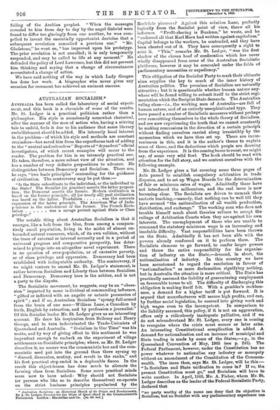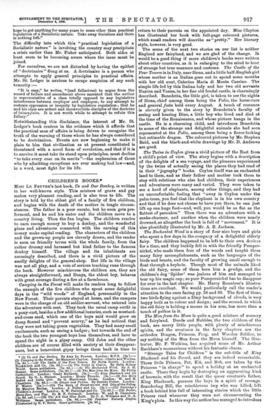AUSTRALIAN SOCIALISM.*
AUSTRALIA has been called the laboratory of social experi- ment, and this book is a chronicle of some of the results.
Mr. St. Ledger is a practical politician rather than a philosopher. His style is occasionally somewhat rhetorical,
after the manner of the man of action who, having a stirring tale to unfold, feels it due to his audience that some literary embellishment should be added. His intensely local interest in the problem—of which his style and methods are constant
reminders—has saved him from the superfluous task of adding to the " neutral and colourless" Reports of " dryasdnst" official investigators, of which recent examples will occur to the reader. The problem for him is an intensely practical one. He takes, therefore, a more robust view of the situation, and has a number of very definite propositions to advance. He distinguishes between Democracy and Socialism. There are,
he says, "two basic principles" contending for the guidance of civilisation. The controversy may be put thus
"Is the State subordinate to the individual, or the individual to the State? The Socialist (in practice) asserts the latter proposi- tion ; the Democrat asserts the former. Modern civilisation is based on the former principle ; all (or nearly all) past civilisation was based on the latter. Feudalism was the concrete expression of the latter principle. The American War of Inde- pmdence is the embodiment of tho former. The French Revo-
lution was a savage protest against State or Class privilege."
The notable thing about Australian Socialism is that it emerges, like a bolt from the blue, from among a compara- tively small population, living in the midst of almost un- bounded natural resources, which, of its own volition, without the trace of external or internal necessity and in a period of
universal progress and comparative prosperity, has deter- mined to plunge into an altogether novel experiment. There is no question of over-population, or of excessive poverty, or of class privilege and oppression. Democracy had been established with indisputable authority. The controversy, if we might venture to amend Mr. St. Ledger's statement, is rather between Socialism and Liberty than between Socialism and Democracy. Democracy here is the arbiter, and is not a party to the dispute.
The Socialistic movement, he suggests, may be an " obses- sion " imparted by some individual of commanding influence, " gifted or inflicted with an angelic or satanic possession of
spirit" ; and if so, Australian Socialism "sprang full-armed from the brain of one man—William Lane, a Canadian by
birth, English by extraction, and by profession a journalist."
Of this Socialist leader Mr. St. Ledger gives ne an interesting account. He drew his inspiration from Bellamy and Henry
George, and in turn indoctrinated the Trade-Unionists of Queensland and Australia. " Socialism in Our Time" was his motto, and by way of giving effect to this sentiment he was imprudent enough to embark on the experiment of village settlements on Socialistic principles; where, as Mr. St Ledger describes it, no sooner was the communistic hoe and the com- munistic seed put into the ground than there sprang np " discord, dissension, mutiny, and revolt in the ranks," and his first practical step ended in a deplorable fiasco. In the result this object-lesson has done much to alienate the farming class from Socialism. Some more practical minds seem now to have asked: Why should not Socialists (or persons who like so to describe themselves) co-operate on the strict business principles popularised by the • Australian Socialism: en Historical Sketch of its Origin and Developments. By A. St Ledger, Senator for the State of Quee, eland in the Commonwealth Parliament London : Macmillan and Co. Lie. 6d. net] Rochdale pioneers ? Against this solution Lane, perfectly logically from the Socialist point -of view, threw all his influence. "Ptofit-sharing is Bunkum," he wrote, and he " endorsed all that Karl Marx had written against capitalism." Capital belongs to the workers, he contended, and they have been cheated out of it. They have consequently a right to seize it. " This," remarks Mr. St. Ledger, " was the first shadow of the cloven hoof of confiscation which has never wholly disappeared from some of the Australian Socialistic platforms, however it may be concealed under the folds of parliamentary necessities or expediency."
This obligation of the Socialist Party to mask their ultimate aims supplies the key to much of the inner history of Australian politics. The promises of Socialism are naturally attractive ; but it is questionable whether human nature any- where will be found willing to submit itself to the strict regi- mentation which the Socialist State demands. The Australian ruling class—i.e., the working men of Australia—are full of human nature, and of an entirely unsophisticated type. They have passed a number of Socialistic measures without perhaps, ever committing themselves to the whole theory of Socialism. and are now experiencing the truth that we cannot oonstantlj be making concessions in the direction of a certain principle without finding ourselves carried along irresistibly by the momentum which we have thus set up. There are incon- veniences in this, and it is the author's theme to explain some of these, and the deductions which people are drawing from the experience. It is the coming home to roost, we might say, of some very wild fowl. The book should be read with attention for the full story, and we content ourselves with the following example.
Mr. St. Ledger gives a list covering some three pages of Acts passed to establish compulsory arbitration in trade disputes, and to set up Wages Boards for the determination of fair or minimum rates of wages. Admittedly these have not introduced the millennium, and the real issue is now becoming clear. The Socialists are driven to unmask their esoteric teaching,—namely, that nothing can be well till they have secured "the nationalisation of all wealth production, distribution, and exchange." The working man who does not trouble himself much about theories refuses to accept the rulings of Arbitration Courts when they are against his own interests. The unemployment of those who are unable to command the statutory minimum wage is an increasing and insoluble difficulty. Vast responsibilities have been thrown on the State. Admittedly it has not been able with the powers already conferred on it to perform them. The Socialists clamour to go forward, to confer larger powers and throw the entire responsibility for the organisa- tion of industry on the State,--demand, in short, the nationalisation of industry. In this country we have been accustomed to regard the resolution in favour of "nationalisation" as mere declamation signifying nothing, but in Australia the situation is more critical. The State has practically assumed the liability of guaranteeing employment on favourable terms to all. The difficulty of discharging this obligation is making itself felt. With a gambler's reckless- ness, a demand for a higher tariff is put forward. It is argued that manufacturers will secure high profits, and can, by further social legislation, be coerced into giving work and high wages even to the incompetent. In comparison to the liability assumed, this policy, if it is not an aggravation, offers only a ridiculously inadequate palliative, and if we do not misunderstand Mr. St. Ledger, every one is coming to recognise where the crisis must sooner or later arise. An interesting Constitutional complication is added. A demand for nationalisation and an increase of municipal and State trading is made by some of the States,—e.g., in the Queensland Convention of May, 1905 (see p. 245). The Federal Parliament, however, under the Constitution has no power whatever to nationalise any industry or monopoly without an amendment of the Constitution of the Common- wealth. The issue then, says Mr. St. Ledger, will be this " Is Socialism and State unification to come in P If co, the present Constitution must go," and Socialism will have to write another. In April, 1905, Mr. A. Fisher, whom Mr. St. Ledger describes as the leader of the Federal Socialistic Party, declared that
"no party worthy of the name can deny that its objective is Socialism, but no Socialist with any parliamentary experience can hope to got anything for many years to come other than practical legislation of a Socialistic nature. Take away Socialism and there is nothing left."
The difficulty into which this "practical legislation of a Socialistic nature" is involving the country may precipitate a crisis earlier than Mr. Fisher anticipated. Both sides at least seem to be becoming aware where the issue must be joined.
For ourselves, we are not disturbed by having the epithet of " doctrinaire " flung at us. A doctrinaire is a person who attempts to apply general principles to practical affairs.
Mr. St. Ledger is anxious to escape suspicion of any such temerity :—
"It is easy," he writes, "(and fallacious) to argue from the record of failure and amendment above narrated that the author is representative of a class totally opposed to any legislative interference between employer and employee; to any attempt to restrain oppression or inequity by legislative regulation ; that he and his class are ardent and inconvertible disciples of the doctrine of laisses-faire. It is not worth while to attempt to refute this fallacy."
Notwithstanding this disclaimer, the interest of Mr. St. Ledger's book centres in the evidence which it affords that the practical man of affairs is being driven to recognise the truth of the warning of those whom he has always considered to be doctrinaires. Events are now beginning to make it plain to him that civilisation as at present constituted is threatened with a novel form of revolution, and that if it is to survive it must take its stand upon principles, must decline "to take every case on its merits "—the euphemism of those who by admitting exceptions are ever making bad law—and, in a IN ord, must fight for its life.







































































 Previous page
Previous page